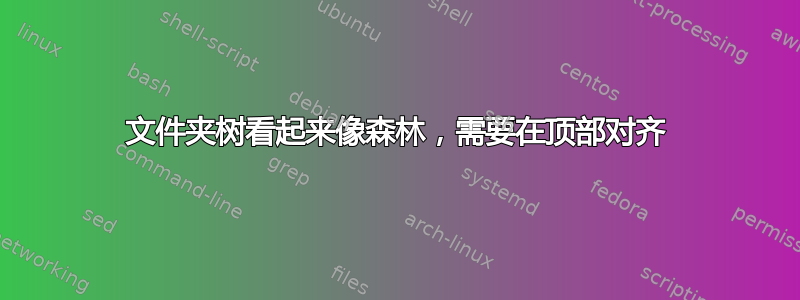
我希望将水平文件夹结构类型的树顶部对齐。但不幸的是,顶部对齐无法产生良好的效果。
我从之前的帖子中摘取了一些代码(制作(简单)目录树) 生成树状文件夹结构。它在底部看起来完美对齐,如下所示:
当我希望使用
begin draw/.code={\begin{tikzpicture}[baseline=(current bounding box.north)]}
或 顶部对齐使用 进行顶部对齐时,\begin{adjustbox}{valign=t}我得到:
完整代码:
%% Compile and read me!
\documentclass[a4paper,12pt]{article}
\usepackage{forest}
\newcommand{\fff}[1]{%\begin{adjustbox}{valign=t}
\begin{forest}
for tree={
font=\ttfamily,
s sep=.5em,
inner sep=1,
grow'=0,
child anchor=west,
parent anchor=south,
anchor=west,
% node distance=1.2cm,
calign=first,
% align=top,
edge path={
\noexpand\path [draw, \forestoption{edge}]
(!u.south west) +(7.5pt,0) |- node[fill,inner sep=1.25pt] {} (.child anchor)\forestoption{edge label};
},
before typesetting nodes={
if n=1
{insert before={[,phantom]}}
{}
},
fit=band,
before computing xy={l=15pt},
begin draw/.code={\begin{tikzpicture}[baseline=(current bounding box.north)]}
}
#1\end{forest}
}
\begin{document}
\begin{figure}
\centering
% \begin{tabular}{ccc}
% \fff{ [Forward ]}&
% \fff{ [repeat [Forward ] ]}&
% \fff{ [if \textit{PathAhead} [Forward] [TurnLeft] ]}
% \end{tabular}
\fff{ [Forward ]}
\fff{ [repeat [Forward ] ]}
\fff{ [if \textit{PathAhead} [Forward] [TurnLeft] ]
}
\caption{Partial correct programs}
\label{tree:partial-correct}
\end{figure}
\end{document}
答案1
如果所有内容的高度和深度都小于或等于 a ,则\strut在 a 中添加 a可以解决偏移问题:font\strut
%% Compile and read me!
\documentclass[a4paper,12pt]{article}
\usepackage{forest}
\newcommand{\fff}[1]{%\begin{adjustbox}{valign=t}
\begin{forest}
for tree={
font=\strut\ttfamily,
s sep=.5em,
inner sep=1,
grow'=0,
child anchor=west,
parent anchor=south,
anchor=west,
% node distance=1.2cm,
calign=first,
% align=top,
edge path={
\noexpand\path [draw, \forestoption{edge}]
(!u.south west) +(7.5pt,0) |- node[fill,inner sep=1.25pt] {} (.child anchor)\forestoption{edge label};
},
before typesetting nodes={
if n=1
{insert before={[,phantom]}}
{}
},
fit=band,
before computing xy={l=15pt},
begin draw/.code={\begin{tikzpicture}[baseline=(current bounding box.north)]}
}
#1\end{forest}
}
\begin{document}
\begin{figure}
\centering
% \begin{tabular}{ccc}
% \fff{ [Forward ]}&
% \fff{ [repeat [Forward ] ]}&
% \fff{ [if \textit{PathAhead} [Forward] [TurnLeft] ]}
% \end{tabular}
\fff{ [Forward ]}
\fff{ [repeat [Forward ] ]}
\fff{ [if \textit{PathAhead} [Forward] [TurnLeft] ]
}
\caption{Partial correct programs}
\label{tree:partial-correct}
\end{figure}
\end{document}
答案2
我会做一些更简单的事情,利用当前的 Forestedges库并避免滥用font。此外,输入的内容也更少。
就我个人而言,除非您有数十个任务要做,否则我不会费心创建它\fff,因为不使用它更清楚,而且几乎不需要输入任何内容。但是,如果您愿意,当然可以。请注意,您的原始定义引入了空格。我不确定这是否是想要的,但我在这里省略了它们。
\documentclass[]{standalone}
\usepackage[edges]{forest}
\forestset{
fff/.style={
for tree={folder, grow'=0, delay={+content=\strut}, edge label={node [midway, inner sep=1.25pt, fill] {}}, font=\ttfamily},
baseline=t
}
}
\newcommand\fff[1]{\Forest{fff#1}}% personally, I wouldn't bother with this
\begin{document}
\Forest{fff[Forward]}
\Forest{fff[repeat[Forward]]}
\Forest{fff[if \textit{PathAhead} [Forward][TurnLeft]]}
% if you must
\fff{ [Forward ]}
\fff{ [repeat [Forward ] ]}
\fff{ [if \textit{PathAhead} [Forward] [TurnLeft] ]}
\end{document}
双重麻烦:






